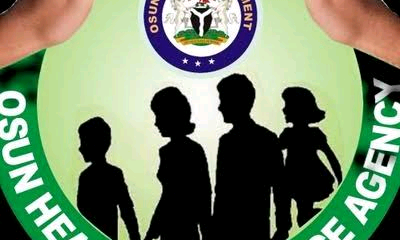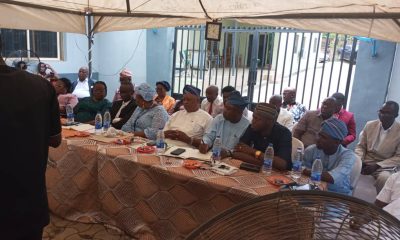News
[ThursdayRapAround] 2023: Whatever Happened To ‘Third Force’?

By Tayo Oke
Very few people remember that ‘Third Force’ entered into the lexicon of political discourse in Nigeria as far back as 2015 when the All Progressives Congress came together as a ‘mega party’ established for the purpose of wresting power from the then ruling party, the Peoples Democratic Party. The PDP had been in power for an unbroken 16 years and had vowed to remain in power for the next 60.
APC won the election on a nebulous campaign for ‘Change’ but also the fact that many people across the ethnic divide believed the promise by the then-candidate, Major General Muhammadu Buhari (retd.), to get a grip on the problem of insecurity as a former general in the Nigerian Army, as well as being ‘Mr. clean’.
From the onset of a new democratic dispensation in 1999, the political field had been in the palsied grip of a potpourri of actors masquerading as new breed politicians, who assembled under the umbrella of PDP, quite literally. Members of the civil society that fought so gallantly for the restoration of democratic order became onlookers, while the parasitic ruling elites and the nouveau rich became deeply entrenched and fortified by the party machine.
The apolitical professionals — lawyers, economists, engineers, bankers, business leaders, and the whole gamut of the Nigerian intelligentsia – had mostly washed their hands off what was generally seen as the ‘dirty game’ of politics overall. The so-called dividends of democracy had been reduced to no more than the art of taking turns to ‘eat’ by the professional politicians. The Nigerian state began to haemorrhage funds and widespread insecurity ensued.
The year 2015 was meant to be such a pivotal year when power needed to change hands. The good news and euphoria that followed the APC victory, however, quickly turned into despair as it became apparent that the elements comprising the new party were mostly a replica of the old guard from the PDP. Talk of a need for a ‘Third Force’ then emerged from the growing disenchantment with PDP and APC. The professionals, and people from the old ‘left’ (radicals to some), in politics are very good at talking but hopeless at organisation.
‘Third Force’ never saw the light of day until close to the election of 2019 when, suddenly, they jumped off their seats and started beating the familiar drumbeat of ‘Third Force’, again. Theoretically speaking, ‘Third Force’ is an assembly of like-minded Nigerian citizens desirous of making government function for the many and not the few. As consequence, to translate words into action, you need power and in order to gain power, you must participate in the ‘dirty game’ of politics first, before you get a chance to clean it up. There lies the dilemma for the transformation of ‘Third Force’ into a viable political machine.
Following a brief loss of momentum, ‘Third Force’ has now dissolved into splinter political formations across the country, absorbing all comers. The idealism and hope embedded in it are now being claimed by many inside some old and new political formations: National Conscience Party, Social Democratic Party, African Action Congress, African Democratic Party, Labour Party, People’s Redemption Party, etc. All of them pinning for recognition as the long-awaited, much desired ‘Third Force’. Divided they stand, indeed.
From not giving a thought to partisan politics, previously, the intelligentsia now has their own special purpose vehicles to mobilise the citizens for participation in the electoral process. Some of them did just that in the presidential election of 2019 but it came to nothing. The “Nigerian Intervention Movement,” at the time, was a coalition from a pool of highly educated, highly versatile, media savvy Nigerian senior citizens across all professions who had wanted to ‘intervene’ by coming down from their hitherto high horses to grab the bull by the horns as it were. And, more importantly, get their hands dirty.
This column commented at the time thus: “If the new coalition wants to win power by playing regular politics, they are much too far behind to make a meaningful impact come 2019”. Reference was also made in the analysis to the fact that the personalities in the new initiative wanted to win power by the strength of ideas and manifesto alone. That, I am afraid, would take a couple of election cycles of voter education to impart the requisite knowledge to an electorate, the bulk of whom are illiterate and hungry.
“After all is said and done, Nigerians do not generally vote for policy or manifesto. What they want and often vote for in elections is their turn to eat,” the column concluded (See 2019: The ‘Third Force’ fever, The PUNCH, January 30, 2018). Is there any reason to shift from this conclusion this time around, in 2022? Maybe.
US President Ronald Reagan (1981-89) set the litmus test for the renewal of a presidential mandate. To close the argument in the final week of his campaign, in 1980, he famously asked the audience: “Are you better off today than you were four years ago?” This test has since been ruthlessly applied across all political parties in elections in America and beyond. The consensus of opinion amongst the experts and pundits applying the test in Nigeria, today, is a resounding no.
The numbers on the economy say it all. From the International Monetary Fund warnings on Nigeria’s runaway inflation to the World Bank’s grim outlook on the deteriorating standard of living for Nigerians to this column and several critical reviews of the economic data, there is no mistaking the bitter truth that Nigeria is infinitely worse off than they were when the APC came into power in 2015. Sensible APC stalwarts know this, even if they will not admit it openly.
Given this, APC’s re-election strategy has been ingeniously choreographed. It is to say, ah, well, Nigeria’s economic condition is dire but this is only following a global trend. Things are bad everywhere. Wait a minute, the US economy has seen billions of dollars pumped into it by the Joe Biden administration since it took office in 2020. Wages are rising and unemployment is running at 3.5%. That is effectively full employment by conventional economic yardsticks. Any unemployment figure below 5% qualifies as such.
Yet, despite the positive job numbers, and a more orderly administration than its predecessor, Democrats are set to be punished by the electorate in the forthcoming mid-term elections in November this year, according to opinion polls. Why? Because inflation is running at an all-time high — 9%. It matters to the voting public. Biden’s approval ratings have sunk to an all-time low partly as a direct consequence. Looking at it objectively, that is most unfair to the president, but, that is what direct accountability looks like.
Nigeria’s 18% inflation and 70% (World Bank says 95.1 million) living below the poverty line still do not render APC accountable electorally. On its part, the PDP feels entitled to be elected without further ado, even as its leaders wallow in a cesspit of acrimony, offering the electorate practically nothing to redeem themselves from their past failings. They expect disenchantment with APC alone to automatically translate into votes for PDP.
Meanwhile, all the ‘Third Force’ groupings out there in the country have become lone rangers, busy operating as islands entirely unto themselves. Their presidential candidates, and their high-profile backers, are oblivious to the significance and greater need of the moment — the adoption of a single, non-partisan Third Force juggernaut, capable of overrunning the established parties.
The likes of Sowore Omoyele, Kingsley Moghalu, Peter Obi, Adewole Adebayo, Pat Utomi, Oby Ezekwesili, Femi Falana and others leading the charge, have now conspired to hang separately. That is not only profoundly ill-advised, it will make victory for either the PDP or APC in 2023 a virtual certainty. How ironic!
-

 News3 days ago
News3 days agoCapacity Building: OHIS Organizes Retreat For New Board Members
-

 News4 days ago
News4 days agoOsun RAAMP Opens Bid For Road Constructions Statewide
-

 News3 days ago
News3 days agoFamily Of Gruesomely Murdered Pastor Cries For Justice
-

 News2 days ago
News2 days agoJust In: Nigerian Governor Dethrones 15 Traditional Rulers, Reinstates 7



